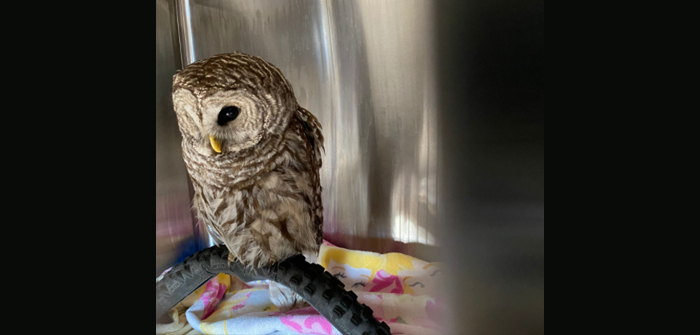(An owl using a bike tire perch | Photo courtesy of Think Wild Central Oregon)
Spring in Central Oregon brings abundant wildlife and human visitors, and with them an increase in the number of injured or orphaned birds in need of help. At local bicycle shops, spring means an increase in tune-ups and discarded tires. These coinciding events have created a unique community partnership, as Hutch’s Bicycles found a way to upcycle their used tires for use as perches for rescued raptors at local wildlife hospital, Think Wild.
By donating their used tires to Think Wild, Hutch’s saved them from the landfill and helped to protect local wildlife. Think Wild volunteer Ann Jamison originally reached out to Hutch’s Bicycles about their used tires after being tasked with making perches. Recent intakes to Think Wild have included a long-eared owl, saw-whet owl, barred owl and red-tailed hawk, all of which have used the donated tires for perches. Strong perches that protect the feet of large raptors are crucial to their rehabilitation and health.
“We are excited to see creative applications for the reuse and upcycling of used bicycle products like tires, saving them from the recycling process or the landfill, and supporting Think Wild’s care of Central Oregon’s wildlife,” said Aaron, Westside Hutch’s manager.
Common causes of injury to raptors include car strikes, window strikes, entanglement in barbed wire and poisoning from lead or rodenticides. At Think Wild, four new raptor enclosures, several raptor hutches, the center’s ICU and an under-construction raptor flight cage are all making use of the tires.
Here are ways you can help raptors in Central Oregon:
- If you find a raptor that you suspect is injured or orphaned, call Think Wild’s wildlife hotline: 541-241-8680
- Removing or capturing wildlife from the wild and keeping it in captivity without a permit is against the law. To ensure their best chance for survival please seek help from a qualified licensed wildlife rehabilitator.
- Use natural forms of pest control and non-lead bullets to prevent lead and rodenticide poisoning of native birds of prey. Owl nest boxes on your property are a great way to promote natural pest control by predation.
- Remove barbed-wire fencing. Sam Bachman at Deschutes County Juvenile Community Justice offers a free barbed wire fence removal; just call 541‐322‐7650.
- The average cost of care for one raptor from intake to release is anywhere from $100- $500. To support Think Wild’s efforts in caring for raptors as they enter the busiest season for intakes, donate funds or supplies at thinkwildco.org/donate or mail to P.O. Box 5093 Bend, OR 97708
This list is non-exhaustive, but we hope that you find it helpful. If you ever have any questions, Think Wild’s wildlife hotline, 541-241-8680, is available seven days a week from 8am-5pm. Think Wild is a 501(c)(3) nonprofit organization.
thinkwildco.org • info@thinkwildco.org • facebook.com/ThinkWildCo





